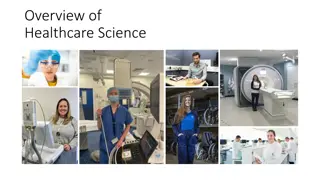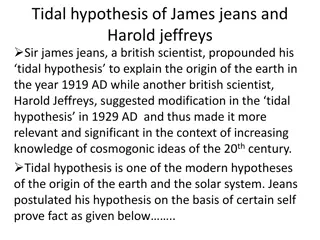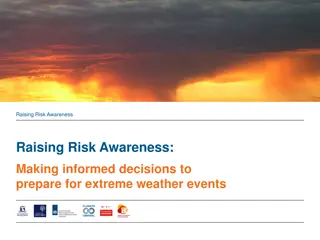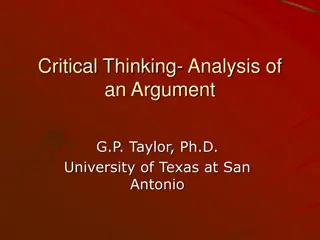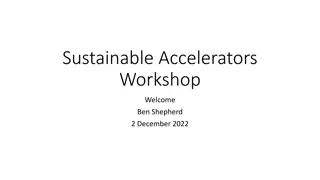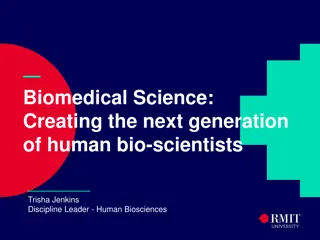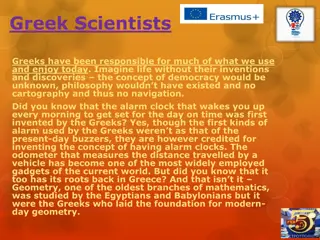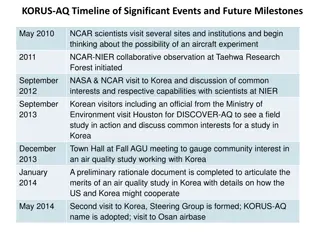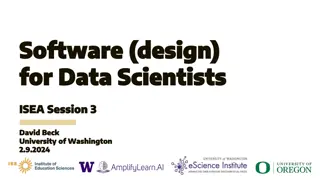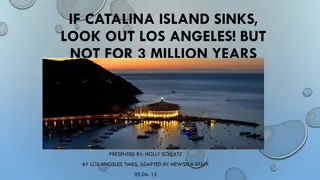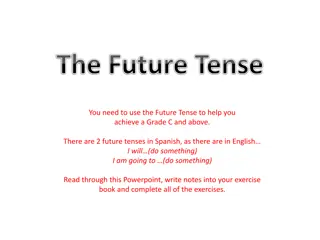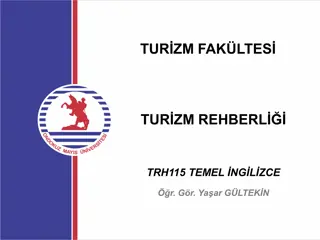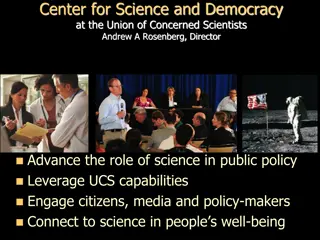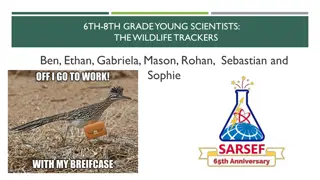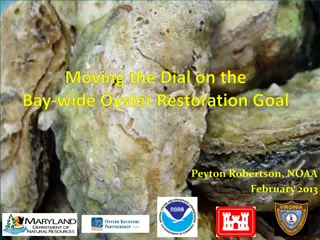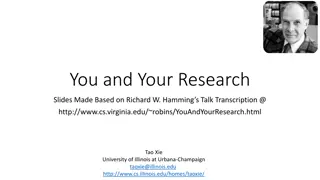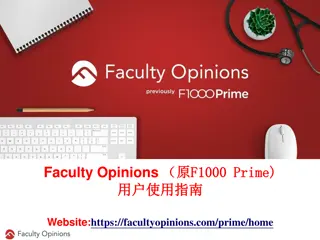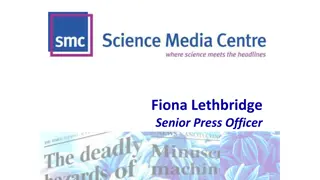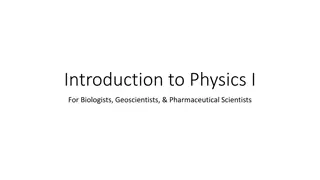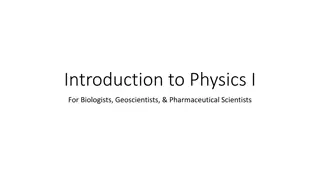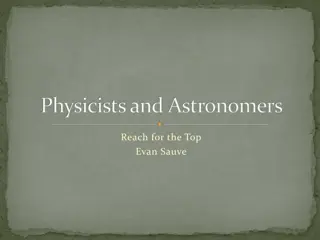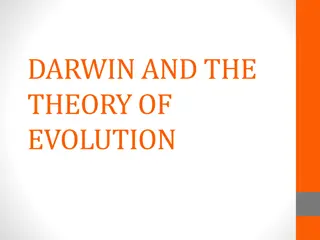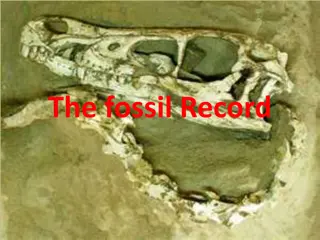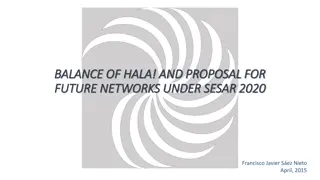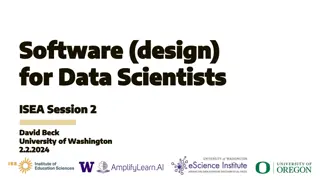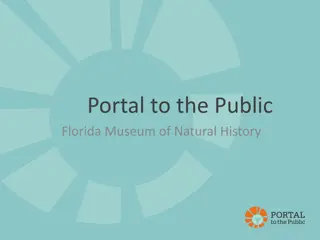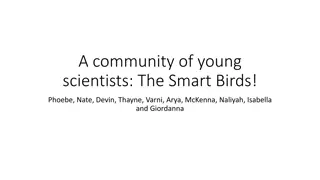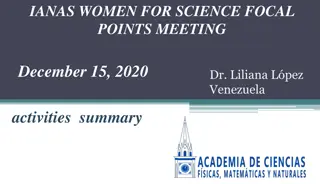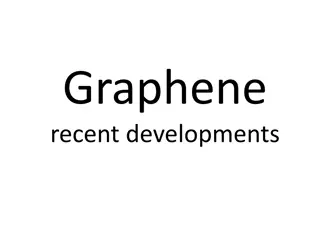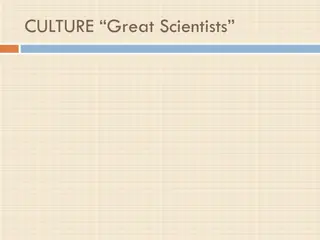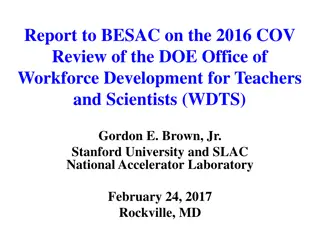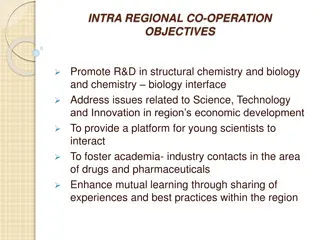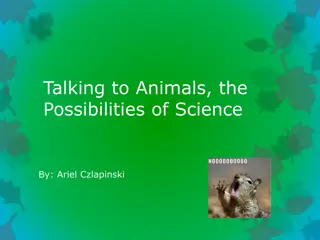Elementary Scientists and Inventors Escape Room
Explore the world of scientists and inventors through an engaging escape room activity. Dive into the lives of individuals like Elizabeth Blackwell, Ada Lovelace, and Isaac Newton by completing interactive tasks that challenge your knowledge and problem-solving skills. Uncover codes, match inventors
0 views • 24 slides
Global Climate Models
Scientists simulate the climate system and project future scenarios by observing, measuring, and applying knowledge to computer models. These models represent Earth's surface and atmosphere using mathematical equations, which are converted to computer code. Supercomputers solve these equations to pr
3 views • 15 slides
Future Connect 2023 Summary Document Overview
Future Connect 2023 is a core guidance resource for Auckland's strategic network, providing a whole-system view of the networks across different modes of transport. It outlines key challenges, informs investment planning decisions, and has been updated in preparation for the 2024-2034 Regional Land
7 views • 18 slides
Understanding Algorithm Analysis and Scalability in Computer Science
Scientists and computer scientists often encounter scale differences, and scalability is crucial for accommodating growing inputs. Algorithm analysis, data structures, running times, and experimental studies are key aspects explored in the context of algorithms. Choosing the right type of plot for l
4 views • 17 slides
Comprehensive Guide to End Point Assessment (EPA) for Apprenticeship
This detailed guide provides an overview of the End Point Assessment (EPA) process for apprenticeships, including timelines, requirements, and key steps such as project presentation, vocational competence discussion, and scenario evaluation. It covers aspects like completing the apprenticeship, Gate
4 views • 30 slides
Insights into Healthcare Science Careers and Specializations
Explore the diverse field of healthcare science through roles like biomedical scientists, clinical scientists, and support workers. Learn about the wide-ranging duties and specializations within the healthcare science sector, including laboratory research, equipment development, and patient care. Di
0 views • 17 slides
The Tidal Hypothesis of James Jeans and Harold Jeffreys: Origin of the Earth
The Tidal Hypothesis proposed by British scientists James Jeans and Harold Jeffreys in the early 20th century suggested that the Earth and solar system were formed from the interaction of the Sun and an intruding star. Jeans postulated that massive gravitational forces from the intruding star caused
2 views • 5 slides
Raising Risk Awareness: Understanding Extreme Weather Events
Raising Risk Awareness initiative focuses on attributing extreme weather events to climate change in Ethiopia, Kenya, India, and Bangladesh. Scientists and experts collaborate to assess risks, prioritize adaptation solutions, and reduce vulnerability by making informed decisions. By understanding th
0 views • 18 slides
Enhancing Critical Thinking Skills in Scientific Research
Critical thinking plays a pivotal role in scientific endeavors, enabling researchers to observe, hypothesize, experiment, and draw valid conclusions. Being a natural skeptic is crucial for scientists to scrutinize research papers effectively. By carefully analyzing prior findings, research technique
2 views • 20 slides
Sustainable Accelerators Workshop by ASTeC at STFC Daresbury Laboratory
ASTeC at STFC Daresbury Laboratory is hosting a workshop on improving the sustainability of particle accelerators, aiming to bring together scientists, engineers, and stakeholders to enhance current and future accelerator sustainability. The agenda includes discussions on reducing emissions, green t
0 views • 5 slides
Exploring Biomedical Science: Shaping Future Human Bio-Scientists
Biomedical science plays a pivotal role in understanding human body functions, addressing malfunctions, and improving health outcomes. Students in disciplines like Human Biosciences, Laboratory Medicine, and Pharmaceutical Sciences engage in a variety of subjects such as Biochemistry, Physiology, an
0 views • 7 slides
Contributions of Greek Scientists to Modern Society
Greeks have made significant contributions to modern society through their inventions and discoveries. Without their innovations, concepts like democracy, philosophy, cartography, and navigation would be unknown. Greek scientists like Thales of Miletus, Aristotle, and Pythagoras laid the foundation
0 views • 14 slides
KORUS-AQ Timeline of Significant Events and Future Milestones
NCAR scientists explore the possibility of an aircraft experiment in Korea leading to the formation of KORUS-AQ. Collaborative efforts, meetings, and preparations are made over several years, culminating in the finalization of the International Agreement and deployment plans. The timeline showcases
0 views • 14 slides
Understanding Software Design Principles for Data Scientists
Explore the importance of clear design in software development for data scientists, learning from past failures like the Therac-25 incident. Dive into creating understandable designs, user stories, and the significance of simplicity and careful feature selection. Follow a practical example in design
0 views • 88 slides
Potential Sinking of Catalina Island Raises Concerns for Los Angeles
Santa Catalina Island may be sinking, posing a future risk of a tsunami to the mainland. Scientists are studying the island's tilt and potential landslides to determine its geological changes. The presence of ancient fossils could confirm whether Catalina is sinking or rising, with implications for
0 views • 5 slides
Understanding Future Progressive Tense in English Grammar
Future Progressive Tense, also known as Future Continuous Tense, is used to indicate actions that will be ongoing at a specific point in the future. This tense emphasizes the continuous nature of an action happening in the future. Learn how to form and use the Future Progressive Tense through exampl
0 views • 22 slides
Mastering the Future Tense in Spanish
Learn how to use the future tense in Spanish to improve your language skills and achieve better grades. Explore the two future tenses in Spanish, the near future structure with "ir + infinitive," and the simple future with verb endings. Practice translating sentences to and from Spanish to strengthe
0 views • 9 slides
Understanding Future Simple Tense in English Grammar
The Future Simple Tense in English is used to express decisions made at the moment of speaking, announce planned future events, show willingness or unwillingness for future actions, express thoughts, and talk about events certain to happen. It is often accompanied by adverbs to indicate timing. Ques
0 views • 11 slides
Understanding Future Tense in Grammar
Future tense in grammar signifies events that have not occurred yet but are expected to happen in the future. While English lacks a distinct future tense form, it expresses future events through auxiliary verbs like will, shall, and going to. Relative tense, on the other hand, compares time referenc
0 views • 28 slides
Advancing Science in Public Policy: The Role of the Union of Concerned Scientists
The Center for Science and Democracy at the Union of Concerned Scientists, led by Director Andrew A. Rosenberg, aims to promote the role of science in public policy by leveraging UCS capabilities and engaging citizens, media, and policymakers. Strengthening the voice for science through the UCS Scie
0 views • 5 slides
Young Scientists Investigate Wildlife Behavior and Habitat Effects
The Wildlife Trackers, a group of young scientists, conducted a study to understand how the presence of people and different habitats affect the behavior and flight responses of animals in their neighborhood. By measuring flight response distances of various animals like birds, lizards, and rabbits,
0 views • 11 slides
Oyster Restoration Efforts in Chesapeake Bay
Efforts are underway to restore oyster populations in Chesapeake Bay tributaries by 2025. Various workgroups, stakeholders, and scientists are collaborating to define restoration goals, develop tributary plans, conduct population surveys, and manage the restoration process. The Harris Creek tributar
0 views • 17 slides
Characteristics of Great Scientists: Insights from Richard W. Hamming's Talk
Explore the essential characteristics of great scientists as outlined by Richard W. Hamming. Delve into the role of luck, courage, age, and working conditions in shaping scientific success. Gain valuable perspectives on the mindset and approach necessary for making impactful contributions in the fie
0 views • 37 slides
Discover Faculty Opinions: A Platform for Scientific Insights
Faculty Opinions, powered by F1000 Prime, is a platform where over 8,000 leading life scientists nominate and review important research articles. With personalized alerts and expert commentary, scientists can stay updated on groundbreaking discoveries without sifting through vast amounts of literatu
0 views • 25 slides
Celebrating Efforts of Scientists, Statisticians, and Journalists: Promoting Access to Best Science and Engaging the Experts
There is much to appreciate in the collaborative efforts of scientists, statisticians, and journalists in ensuring accurate and relevant information reaches the public. With the rising politicization of science, it is crucial to maintain access to the best scientific knowledge for journalists and en
0 views • 8 slides
Introduction to Physics I for Biologists, Geoscientists, & Pharmaceutical Scientists
Delve into the fundamental concepts of physics tailored for biologists, geoscientists, and pharmaceutical scientists. Explore key principles and applications in a concise and engaging manner, enhancing your understanding of the physical world around us.
0 views • 4 slides
Physics Course for Biologists, Geoscientists, and Pharmaceutical Scientists
This physics course tailored for biologists, geoscientists, and pharmaceutical scientists covers lectures, exercises, and exams in both English and German. The course includes weekly exercise sessions, recommended literature, exam details, and study materials available on the course website. Student
0 views • 15 slides
Influential Scientists in History: Newton, Hawking, Einstein, and Kepler
Explore the remarkable contributions of influential scientists from different eras - Sir Isaac Newton, Stephen Hawking, Albert Einstein, and Johannes Kepler. Learn about Newton's laws of motion, Einstein's theory of relativity, Hawking's work on black holes, and Kepler's laws of planetary motion.
0 views • 10 slides
Darwin and the Theory of Evolution: A Comprehensive Overview
Darwin's Theory of Evolution encompasses the concepts of organisms changing over time and life evolving through natural selection. Influenced by scientists such as James Hutton, Jean Baptiste Lamarck, and Alfred Russel Wallace, Darwin's theory culminates in the idea of evolution by natural selection
0 views • 9 slides
Understanding Fossils: Formation, Types, and Significance
Explore the world of fossils and learn about their formation process, different types such as mold, cast, and petrified fossils, and the valuable insights they provide to scientists. Discover how fossils capture the remains of ancient plants and animals, revealing clues about the past through their
0 views • 25 slides
Contribution of HALA Network to ATM Community and SESAR 2020: Achievements and Future Directions
HALA network has been instrumental in fostering research and innovation in the field of automation for ATM systems, providing a platform for knowledge dissemination, collaboration, and advancement. The network has facilitated exploratory research, encouraged young scientists' participation, and crea
0 views • 12 slides
Understanding the Importance of Software Design for Data Scientists
Today's ISEA Session 2 with David Beck from the University of Washington delves into the critical role of intentional software design for data scientists. The session covers the software design approach, user-centric design stories, use cases, components, testing strategies, and the benefits and dra
0 views • 76 slides
Exploring the Portal to the Public at the Florida Museum of Natural History
The Portal to the Public program at the Florida Museum of Natural History aims to bridge the gap between scientists and the public through interactive sessions. The program focuses on informal science education, STEM learning, and science communication workshops for scientists. Funded by the Nationa
0 views • 15 slides
Insights from Young Scientists on How Temperature Affects Bird Behavior
A group of young scientists known as the Smart Birds conducted a study on how temperature influences bird behavior. Through observations recorded in the morning and late afternoon, they found that birds were most active when the temperature ranged between 71-90 degrees Fahrenheit. The study revealed
0 views • 14 slides
Advancing Women in Science: Activities and Future Plans in Venezuela
Highlighting notable activities in 2020 related to women in science in Venezuela, including meetings, prizes, and publications. Future plans involve forming a Women in Science Network to support and empower Venezuelan female scientists.
0 views • 5 slides
Exploring the Fascinating World of Graphene: Recent Developments and Future Applications
Graphene, a single thin layer of graphite, has revolutionized the field of materials science since its discovery in 2004. This remarkable material, composed of tightly packed carbon atoms in a hexagonal pattern, possesses exceptional properties, including high electrical conductivity, mechanical str
0 views • 21 slides
Great Scientists Who Shaped Our World
Discover the remarkable contributions of renowned scientists like Galileo, Louis Pasteur, Karl Landsteiner, Francis Crick, James Watson, and Jane Goodall. From revolutionizing astronomy to groundbreaking discoveries in microbiology and genetics, these brilliant minds have left a lasting impact on me
0 views • 8 slides
Review of DOE Office of Workforce Development for Scientists
Assessment of the 2016 review of the Department of Energy's Office of Workforce Development for Teachers and Scientists (WDTS) including its mission, programs reviewed, charges, and additional considerations to enhance workforce development in STEM fields.
0 views • 25 slides
Strategies for Enhancing Scientific Collaboration in South Asia
This content highlights the objectives of intra-regional co-operation to promote R&D in structural chemistry and biology, address science, technology, and innovation issues, create platforms for young scientists, foster academia-industry contacts in pharmaceuticals, and share best practices within t
0 views • 4 slides
Could Humans Really Talk to Animals? Exploring the Potential Through Science
Discover the fascinating world of communication between humans and animals as scientists delve into the possibility of translating thoughts and ideas across species boundaries. From Nim Chimpsky to Alex the African grey parrot, examples show how intelligent creatures can learn to communicate through
0 views • 5 slides





